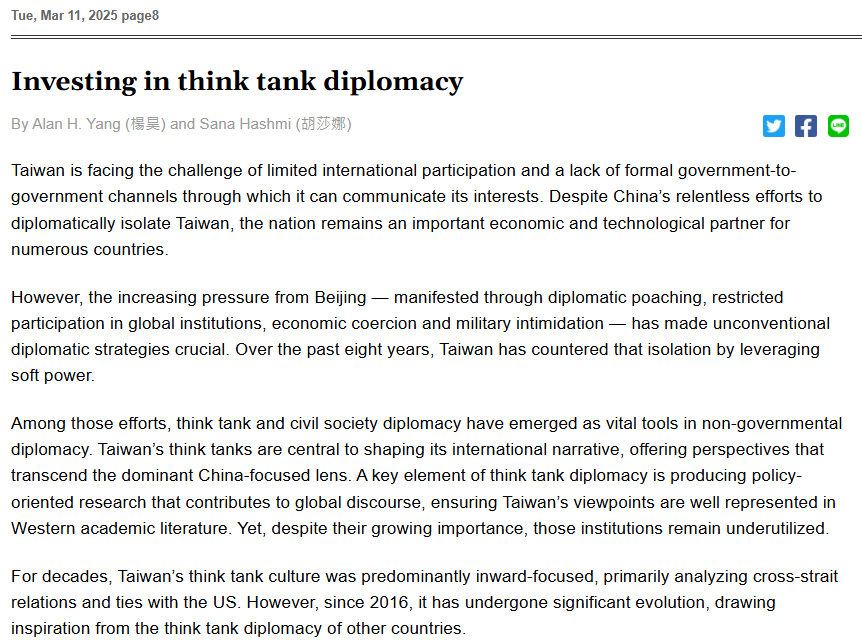Taiwan is facing the challenge of limited international participation and a lack of formal government-to-government channels through which it can communicate its interests. Despite China’s relentless efforts to diplomatically isolate Taiwan, the nation remains an important economic and technological partner for numerous countries.
However, the increasing pressure from Beijing — manifested through diplomatic poaching, restricted participation in global institutions, economic coercion and military intimidation — has made unconventional diplomatic strategies crucial. Over the past eight years, Taiwan has countered that isolation by leveraging soft power.
Among those efforts, think tank and civil society diplomacy have emerged as vital tools in non-governmental diplomacy. Taiwan’s think tanks are central to shaping its international narrative, offering perspectives that transcend the dominant China-focused lens. A key element of think tank diplomacy is producing policy-oriented research that contributes to global discourse, ensuring Taiwan’s viewpoints are well represented in Western academic literature. Yet, despite their growing importance, those institutions remain underutilized.
For decades, Taiwan’s think tank culture was predominantly inward-focused, primarily analyzing cross-strait relations and ties with the US. However, since 2016, it has undergone significant evolution, drawing inspiration from the think tank diplomacy of other countries.
As global geopolitics shift, think tanks have become indispensable conduits for foreign policy. Although Taiwan was slow to recognize their potential, that realization came at a critical moment. With China suspending dialogue following the Democratic Progressive Party’s (DPP) rise to power in 2016, Taiwan’s international isolation deepened. In response, then-president Tsai Ing-wen (蔡英文) spearheaded the establishment of several think tanks to enhance global outreach and communicate Taiwan’s perspective. One such institution, the Institute for National Defense and Security Research, has played a crucial role in conducting war simulations domestically and internationally, strengthening the nation’s defense strategy.
Taiwan’s think tank landscape has since transformed. No longer mere academic observers, those institutions now shape policymaking. High-level foreign policy dialogues are hosted by multidisciplinary think tanks, such as the Ketagalan Forum, which focuses on Indo-Pacific geopolitics, and the Yushan Forum — organized by the Taiwan-Asia Exchange Foundation — which fosters ties with New Southbound Policy partner countries while projecting Taiwan’s soft power. Amidst geopolitical turmoil and the ongoing threat from China, it is crucial for Taiwan to continue empowering those annual foreign policy dialogues.
The upcoming Yushan Forum, now one of Taiwan’s most important international dialogue platforms, would facilitate exchanges with policymakers and academics from countries where the China factor is prominent, providing an essential avenue for discourse. The theme of this year’s forum, “New Southbound Policy+: Taiwan, the Indo-Pacific, and the New World,” aligns with President William Lai’s (賴清德) foreign policy strategy, which aims to deepen Taiwan’s engagement with neighboring countries and address Indo-Pacific dynamics. Key topics for discussion would include smart solutions, technology and economic cooperation. Expanding those dialogues is essential for enhancing Taiwan’s outreach and bridging gaps between academia, policymakers, think tanks and civil society. Events such as the Halifax Forum, held in Taipei for the first time last month, are also increasing Taiwan’s international visibility.
To maximize their potential, think tanks require consistent government support, strategic partnerships and financial stability. Opposition political parties should not hinder funding, as those institutions are integral to shaping policy, fostering dialogue and advancing Taiwan’s global engagement. Regardless of ideological differences, think tanks should be regarded as vital assets for strengthening the nation’s strategic vision. The government must empower existing think tanks and encourage collaboration between the public and private sectors to maximize their impact.
Taiwan should also invest in regional area studies by establishing institutions such as a Taiwan-US Institute, Taiwan-Australia Institute or Taiwan-India Institute, given the growing importance of those relationships. Expanding expertise in those areas would bolster Taiwan’s understanding of its key partners, improve its diplomatic positioning and enhance its global influence.
Furthermore, Taiwan must attract more international think tanks, especially from Asia. Singapore, often perceived as neutral, has become a think tank hub. Taiwan, with its dynamic academic and policy environment, could establish itself as a regional center for intellectual exchange. Hosting foreign think tanks would foster collaboration with existing Taiwanese institutions and further elevate the nation’s global standing. Taiwanese representative offices should take a more active role in lobbying for the expansion of international think tanks in Taiwan.
A stronger foreign think tank presence would enrich Taiwan’s strategic culture and increase its global relevance. If institutions such as the Carnegie Endowment for International Peace can operate in China, India and Russia, and India’s Observer Research Foundation (ORF) has a presence in the US and the Middle East, then the establishment of Carnegie Taiwan or ORF Taiwan is entirely feasible. Such institutions would promote research collaboration and deepen Taiwan’s engagement with New Southbound Policy partner countries, where outreach remains constrained.
By prioritizing think tank diplomacy, Taiwan can navigate geopolitical challenges, build strategic partnerships and ensure its voice is heard on the global stage. In a shifting geopolitical landscape marked by ongoing conflicts, think tanks can function as extensions of the government — interpreting global perspectives while effectively conveying Taiwan’s worldview. Think tanks can reach where governments cannot, and in Taiwan, they should be seen as complementary to policymaking and further cultivated.
Alan H. Yang is a professor at National Chengchi University and executive director at the Taiwan-Asia Exchange Foundation. Sana Hashmi is a fellow at the Taiwan-Asia Exchange Foundation.
For Full Text:https://www.taipeitimes.com/Ne...
